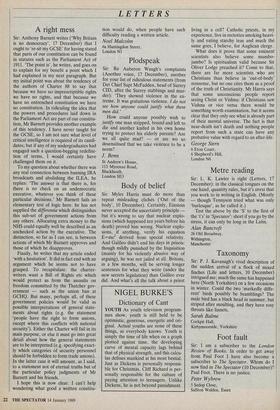LETTERS
A right mess
Sir: Anthony Barnett writes ('Why Britain is no democracy', 17 December) that I ought to 're-sit my GCSE' for having stated that parts of our constitution can be found in statutes such as the Parliament Act of 1911. 'The point is', he writes, and goes on to explain for my benefit a point which I had explained in my next paragraph. But my initial point was about the tendency of the authors of Charter 88 to say that because we have no imprescriptible rights we have no rights, and that because we have no entrenched constitution we have no constitution. In ridiculing the idea that the powers and procedures laid down in the Parliament Act are part of our constitu- tion, Mr Barnett provides another example of this tendency. I have never taught for the GCSE, so I am not sure what level of critical intelligence is required of its candi- dates; but if any of my undergraduates had engaged such a question-begging redefini- tion of terms, I would certainly have challenged them on it.
To my question about whether there was any real connection between banning IRA broadcasts and abolishing the ILEA, he replies: 'The answer is that there is, for there is no check on an undemocratic executive, whatever you think of these particular decisions.' Mr Barnett fails an elementary test of logic here: he has not supplied the differentia which distinguishes this sub-set of government actions from any others. Allocating extra money to the NHS could equally well be described as an unchecked action by the executive. The distinction, so far as I can see, is between actions of which Mr Barnett approves and those of which he disapproves.
Finally, he writes that my article ended `with a hesitation'. It did in fact end with an argument which he seems not to have grasped. To recapitulate: the charter- writers want a Bill of Rights etc which would protect us from the assaults on freedom committed by the Thatcher gov- ernment — such as the union ban at GCHQ. But many, perhaps all, of these government policies would be valid as possible interpretations of general state- ments about rights (e.g. the statement `people have the right to form unions, except where this conflicts with national security'). Either the Charter will fail in its main purpose, or else it must go into great detail about how the general statements are to be interpreted (e.g. specifying exact- ly which categories of security personnel should be forbidden to form trade unions). In the latter case it will amount, as I said, to a statement not of eternal truths but of the particular policy judgments of Mr Barnett and his friends.
I hope this is now clear. I can't help wondering what good a written constitu- tion would do, when people have such difficulty reading a written article.
Noel Malcolm
6a Huntingdon Street, London N1


















































 Previous page
Previous page